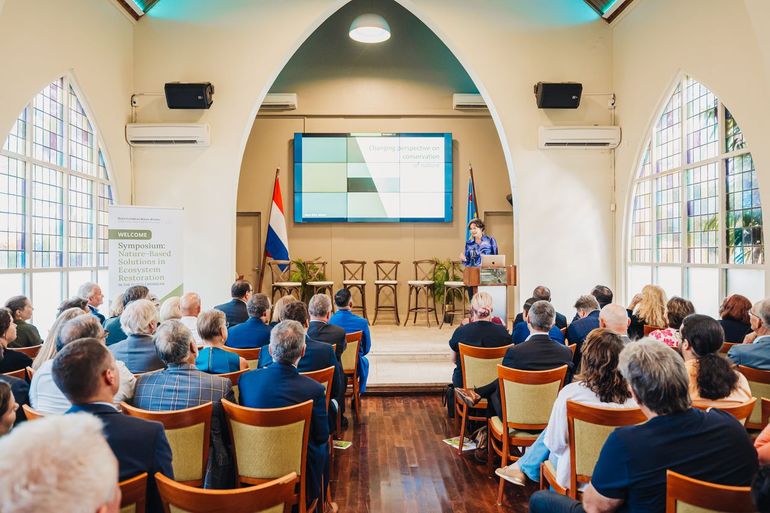
The realities of nature-based solutions
Dutch Caribbean Nature Alliance (DCNA)Professor Jacintha Ellers, a distinguished speaker at the Nature-Based Solutions for Ecosystem Restoration Symposium, shared valuable insights during her closing keynote speech. As a Professor of Evolutionary Ecology, Head of the Department of Ecological Science, and Director of the Amsterdam Institute for Life and Environment, she focused on lessons learned from the symposium and the future implementation of nature-based solutions (NBS) in the Dutch Caribbean islands.
Evolution of nature conservation perspective
The general take on nature conservation has shifted over time. In the 20th century, the most popular conservation strategy belief was to close off protected areas entirely to human activities. However, a shift occurred at the beginning of the 21st century, moving towards an economic perspective, recognizing nature's valuable services for humans. This has shifted once more, with the current emphasis being on the connection between people and nature, promoting nature-based solutions as a way to address societal challenges while investing back in nature.
Importance of NBS in the Caribbean
The Caribbean islands face significant challenges due to their high dependency on natural resources for economic growth, including tourism-based revenues. Furthermore, the islands are particularly vulnerable to the impacts of climate change. nature-based solutions play a crucial role in protecting these islands from climate change consequences by restoring and recreating ecosystems. An example highlighted was the creation of the Bubali wetland in Aruba, which not only purifies wastewater, but also serves as a thriving bird sanctuary, demonstrating the dual benefits of such solutions.

Magic solutions
While nature is a powerful tool to address societal challenges, it cannot compensate for unlimited environmental damage. nature-nased solutions are not a magical fix, they work best when implemented alongside sustainable choices that consider the carrying capacity of the islands. Additionally, Ellers emphasized that these solutions are not cost-free, requiring continued investments for long-term success.
Key for success
To ensure the success of nature-based solutions in the Caribbean, Ellers outlined three key points:
- Evidence-based knowledge generation: Utilize existing knowledge, experience, and data from ongoing projects to inform future initiatives. Establish an open access scientific knowledge base to share best practices.
- Prioritizing community values: Engage local communities and align project goals with their values. Recognize that different community members may prioritize benefits differently, emphasizing the importance of community engagement.
- Robust monitoring and evaluation: Implement comprehensive monitoring and evaluation programs to measure the effectiveness of interventions. Develop a dashboard to track the project's impact on biodiversity, economic use, human health, and other societal challenges.
Successful future
Ellers concluded by advocating for a shift in perspective on nature and expressing optimism about the potential for small islands to become leaders in nature-based solutions. She emphasized the urgency of starting now and presented an approach that involves strengthening existing projects, employing a living lab approach for stakeholder collaboration, and setting achievable goals through a multi-perspective community-supported framework.
To watch the full video of Jacintha Ellers' presentation, please see below or watch the video on Youtube.
The presentation of Jacintha Ellers during the Symposium Nature-Based Solutions for Ecosystem Conservation and Restoration in the Dutch Caribbean (Source: DCNA)
This article is the last one in a series about the NBS Symposium. To (re-)watch the Zoom-recording of the entire symposium, please see below or watch the recording on Youtube.
Symposium Nature-Based Solutions for Ecosystem Conservation and Restoration in the Dutch Caribbean (Source: DCNA)
DCNA
DCNA extends its gratitude towards the sponsors; Milton Harms Fonds in collaboration with Prins Bernhard Cultuurfonds Caribisch Gebied, Aruba Tourism Authority, VNO Ministerie van Binnenlandse Zaken en Koninkrijksrelaties, Grant Thornton, Dutch Postcode Lottery, and Pelican Adventure, for contributing to the symposium and supporting an environment of collaboration and progress, exemplifying the power of partnership in driving positive ecological change.
Learn more about the DCNA by following the DCNA on social media via Facebook (Dutch Caribbean Nature Alliance), Instagram (DCNAnature), LinkedIn (Dutch Caribbean Nature Alliance) and visiting the website.
Text, images and videos: Dutch Caribbean Nature Alliance (leadfoto: Jacintha Ellers)
